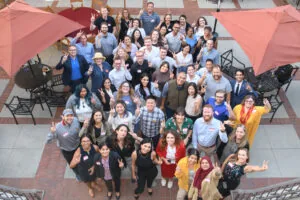Description
Hosted by the USC Safe Communities Institute (SCI) and The Auschwitz Institute for the Prevention of Genocide and Mass Atrocities (AIPG), this seminar focuses on the necessities of law enforcement programs outside of the department itself. The discussion addresses unique aspects that typically are not incorporated in police officer training, including civil and human rights protection education, the social psychology of perpetrators of identity-based violence, the specific realities of policing in traumatized communities and working with civilian oversight mechanisms.
The webinar features Erroll Southers, SCI director; James Waller, director of academic programs at The Auschwitz Institute; Peter McBride, director of The Cohen Center for Holocaust and Genocide Studies at Keene State College; Sharon Fairley, professor from Practice University of Chicago Law School; and Aaron Ponce, LAPD captain. Moderated by Jessie Redd, SCI associate director.
Who Will Benefit
– Those hoping to understand the importance of police officer training outside of law enforcement agencies
– Criminal justice professionals who want to access tools for policing in traumatized communities
– Those looking for successful examples of civilian oversight of law enforcement
About Our Featured Faculty
Erroll Southers is a professor of the practice in national and homeland security, director of the Safe Communities Institute (SCI), and director of Homegrown Violent Extremism Studies in the USC Sol Price School of Public Policy. He is a former FBI special agent, who has served in counterterrorism and public safety positions at every level of government. Southers was President Barack Obama’s first nominee for Transportation Security Administration assistant secretary of the Department of Homeland Security (DHS) and Governor Arnold Schwarzenegger’s appointee as deputy director for Critical Infrastructure of the California Office of Homeland Security, where he led the identification, prioritization and protection of the state’s potential terror targets, the nation’s largest such dataset. He served as assistant chief of Homeland Security and Intelligence at the Los Angeles World Airports Police Department, police officer and gang investigator with the Santa Monica Police Department and enjoyed the distinction of being a member of FBI SWAT.
Southers arrived at USC in 2003, where he began as an adjunct professor in the USC School of Policy Planning and Development. His work spans many fields including counterterrorism, homegrown violent extremism, terrorist recruitment and radicalization, critical infrastructure protection and community resistance to terrorism. Southers earned his undergraduate degree from Brown University, and he holds master’s and doctoral degrees in public policy from USC.
Jessie Redd is the associate director of the Safe Communities Institute (SCI), where she supervises the strategic directions and coordinates SCI’s certificate programs, conducts research, manages the institute’s digital presences, oversees the budget, and develops events and other programming and projects. Prior to her appointment at USC, Redd worked for the Glendale University College of Law (GUCL) as an admissions counselor, recruiting prospective law students and supporting their goals. Before that, she interned for Sen. Marco Rubio on Capitol Hill and in his Miami field office, working directly with the senator’s foreign policy team and supporting the Electrify Africa Act of 2015.
Redd earned a Master of Public Administration with honors from Florida International University (FIU) and holds a certificate in Homeland Security and Emergency Management. While at FIU, she was selected to participate in the Policy Solutions Challenge USA, a national competition among teams of students from U.S. schools of public policy, public affairs and public administration to develop innovative solutions to the most important policy problems. She received a BA in Sociology with a minor in Forensics and Criminality from USC in 2013. She is also Community Emergency Response Team certified.



